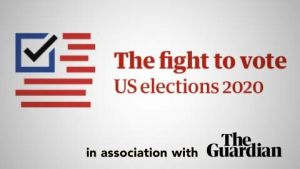
Photo by mark_irvine / flickr CC 2.0)
Away from the presidential and congressional races, at least 124 statutory and constitutional questions were put to voters in 32 US states and the District of Columbia, according to the National Conference of State Legislatures (NCSL).
The pandemic dampened grassroots enthusiasm for circulating petitions to get measures on the ballot, as citizen-led initiatives this year dropped to 38, from 60 in 2018 and 72 in 2016, the NCSL said. But the 2020 crop of ballot measures still covered a wide array of issues, from election laws to abortion rights to worker rights and taxes. Here are some of key results:
Marijuana
Voters in New Jersey, Arizona, South Dakota and Montana approved measures to legalise marijuana for recreational use, and South Dakota and Mississippi approved the drug’s use for medical purposes. Since 1996, 33 other states and the District of Columbia have allowed medical marijuana, 11 had previously approved its recreational use and 16, including some medical marijuana states, have decriminalised simple possession, according to the National Organization for the Reform of Marijuana Laws.
Psilocybin (magic mushrooms)
Psilocybin, a hallucinogen also known in its raw form as magic mushrooms, was approved by Oregon voters for therapeutic use for adults. Backers of the Psilocybin Services Act cited research showing benefits of the drug as a treatment for anxiety disorders and other mental health conditions. The approved measure sets a two-year schedule to review the matter and create a regulatory structure for its sale.
In a related measure, Washington DC voters approved Initiative 81, which directs police to rank “entheogenic plants and fungi,” including psilocybin and mescaline, among its lowest enforcement priorities.
Minimum wage
Voters in Florida approved a measure to amend the state constitution to gradually increase its $8.56 per hour minimum wage to $15 by 30 September 2026.
California gig workers
California voters approved a measure that would exempt ride-share and delivery drivers from a state law that makes them employees, not contractors. The measure, Proposition 22, is the first gig-economy question to go before statewide voters in a campaign. Backers including Uber and Lyft spent more than $190m on their campaign, making it the costliest ballot measure ever, according to the NCSL.
Abortion
Colorado voters rejected a measure to ban abortions, except those needed to save the life of the mother, after 22 weeks of pregnancy. In Louisiana, voters approved an amendment that makes clear that the state constitution does not protect abortion rights or funding for abortions. The amendment clears the way for the state to outlaw abortion if the US supreme court overturns the landmark Roe v Wade decision that protects abortion rights under the US constitution.
Elections
Ranked-choice voting, which lets voters select state and federal candidates in order of preference, was rejected by Massachusetts voters. Only Maine lets its voters use the method statewide. A citizen-initiated measure on the issue was also on the ballot in Alaska, but results there were incomplete. California approved a measure to restore the right to vote to parolees convicted of felonies.
Taxes
In California, a proposal to roll back a portion of the state’s landmark Proposition 13 law limiting property taxes was too close to call on Wednesday. The measure, Proposition 15 on the state’s 2020 ballot, would leave in place protections for residential properties but raise taxes on commercial properties worth more than $3m.

